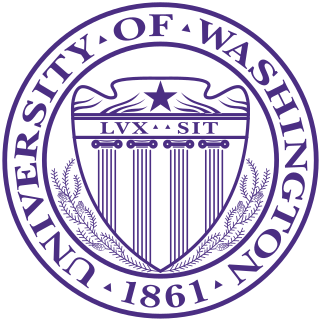
The University of Washington is a public research university in Seattle, Washington.

Elsevier is a Dutch information and analytics company and one of the world's major providers of scientific, technical, and medical information. It was established in 1880 as a publishing company. It is a part of the RELX Group, known until 2015 as Reed Elsevier. Its products include journals such as The Lancet and Cell, the ScienceDirect collection of electronic journals, the Trends and Current Opinion series of journals, the online citation database Scopus, and the ClinicalKey solution for clinicians. Elsevier's products and services include the entire academic research lifecycle, including software and data-management, instruction and assessment tools.

Ars Technica is a website covering news and opinions in technology, science, politics, and society, created by Ken Fisher and Jon Stokes in 1998. It publishes news, reviews, and guides on issues such as computer hardware and software, science, technology policy, and video games. Many of the site's writers are postgraduates and some work for research institutions. Articles on the website are written in a less-formal tone than those in traditional journals.
HuffPost is an American news and opinion website and blog, with localized and international editions. It is edited from a left wing political perspective. It was founded in 2005 by Andrew Breitbart, Arianna Huffington, Kenneth Lerer and Jonah Peretti. The site offers news, satire, blogs, and original content and covers politics, business, entertainment, environment, technology, popular media, lifestyle, culture, comedy, healthy living, women's interests, and local news.
Sandy Lerner is an American businesswoman and philanthropist. She co-founded Cisco Systems, and used the money from its sale to pursue interests in animal welfare and women's writing. One of her main projects, Chawton House, is in England, but most of her work remains in the United States.

The University of Wisconsin–La Crosse is a public university in La Crosse, Wisconsin. Founded in 1909, it is part of the University of Wisconsin System and awards bachelor's, master's, and doctoral degrees. UW–La Crosse is organized into five schools and colleges offering 100 undergraduate programs, 22 graduate programs, and 2 doctoral programs. With an annual operating budget of $227 million, it is one of the largest in the UW System. The university has nearly 85,000 alumni across all 50 U.S. states and 57 countries.

Science journalism conveys reporting about science to the public. The field typically involves interactions between scientists, journalists, and the public.
Phys.org is a science, research and technology news aggregator where much of the content is republished directly from press releases and news agencies-in a practice known as churnalism. It also produces some science journalism.
Science Daily is an American website that aggregates press releases and publishes lightly edited press releases about science, similar to Phys.org and EurekAlert!.

The University of Wisconsin School of Medicine and Public Health (UWSMPH) is a professional school for the study of medicine and public health at the University of Wisconsin–Madison. It is one of only two medical schools in Wisconsin, along with the Medical College of Wisconsin in Milwaukee, and the only public one.
Database journalism or structured journalism is a principle in information management whereby news content is organized around structured pieces of data, as opposed to news stories. See also Datajournalism

The College of Journalism and Communications is an academic college of the University of Florida. It comprises four departments:

The University of Wisconsin–Madison is a public research university in Madison, Wisconsin. Founded when Wisconsin achieved statehood in 1848, UW–Madison is the official state university of Wisconsin, and the flagship campus of the University of Wisconsin System. It was the first public university established in Wisconsin and remains the oldest and largest public university in the state. It became a land-grant institution in 1866. The 933-acre (378 ha) main campus, located on the shores of Lake Mendota, includes four National Historic Landmarks. The University also owns and operates a historic 1,200-acre (486 ha) arboretum established in 1932, located 4 miles (6.4 km) south of the main campus.
The Texas Tribune is a nonprofit media organization in Texas. Headquartered in Austin, Texas, it aims to promote civic engagement through original, explanatory journalism and public events. Its website and content in various delivery platforms serves as an alternative news source for Texas, with a goal of supplementing mainstream media sources.
Computational Journalism can be defined as the application of computation to the activities of journalism such as information gathering, organization, sensemaking, communication and dissemination of news information, while upholding values of journalism such as accuracy and verifiability. The field draws on technical aspects of computer science including artificial intelligence, content analysis, visualization, personalization and recommender systems as well as aspects of social computing and information science.
The School ofJournalism & Mass Communication is the journalism school of the University of Wisconsin–Madison. Located in Vilas Communication Hall, the School offers two undergraduate programs, two Master of Arts programs in Journalism, and a doctoral program jointly administered with the Department of Life Sciences Communication.

Evan Thomas Spiegel is an American businessman who is the co-founder and CEO of the American multinational technology and social media company Snap Inc., which he created with Bobby Murphy and Reggie Brown while they were students at Stanford University. Spiegel was named the youngest billionaire in the world in 2015.

Vox is an American news and opinion website owned by Vox Media. The website was founded in April 2014 by Ezra Klein, Matt Yglesias and Melissa Bell, and is noted for its concept of explanatory journalism.

The Nexus for Exoplanet System Science (NExSS) initiative is a National Aeronautics and Space Administration (NASA) virtual institute designed to foster interdisciplinary collaboration in the search for life on exoplanets. Led by the Ames Research Center, the NASA Exoplanet Science Institute, and the Goddard Institute for Space Studies, NExSS will help organize the search for life on exoplanets from participating research teams and acquire new knowledge about exoplanets and extrasolar planetary systems.





















